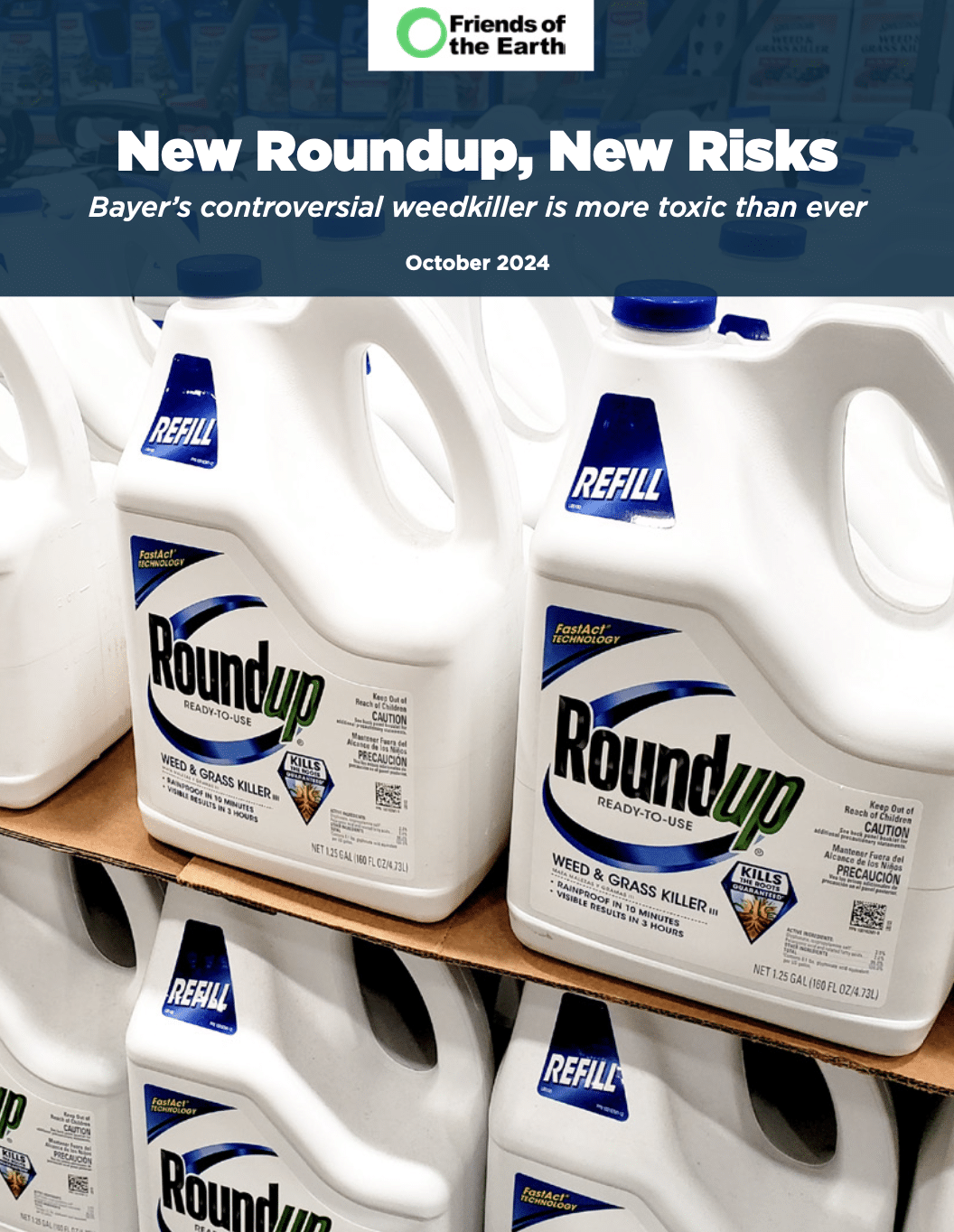New Roundup, New Risks

Friends of the Earth’s analysis finds that, on the fiftieth anniversary of its commercialization, Roundup sold to consumers is more toxic than ever before. Bayer pledged to remove glyphosate from Roundup products sold to U.S. consumers (which does not include agricultural or professional use Roundup) starting in 2023, in response to tens of thousands of lawsuits linking the weedkiller to non-Hodgkin’s lymphoma.
We found that Bayer replaced glyphosate with combinations of four chemicals, two of which are banned in the European Union. The new Roundup formulations are 45 times more toxic to human health following long-term, chronic exposures, on average. They also pose significantly greater risks to the environment. What’s more, we found that Bayer has failed to remove glyphosate from all U.S. consumer Roundup products.
Bayer’s failure to warn consumers about the new risks posed by its reformulation of Roundup is negligent and should be unlawful. The fifty-year history of Roundup shows that chemical companies like Bayer cannot be trusted to protect consumer health. It is essential that lawmakers and regulatory agencies, including a strengthened Environmental Protection Agency (EPA), take responsibility for ensuring that people and ecosystems are safeguarded against toxic chemicals and the unethical activities of the companies that manufacture them.
Read the press release
Read the full report
For more on the history of Roundup, read Merchants of Poison: How Monsanto Sold the World on a Toxic Pesticide
Key Findings
We analyzed labels to look for active ingredients in Roundup weedkiller sold at the two largest lawn and garden stores in the U.S., Home Depot and Lowe’s, in 2024. We found that:
- Several Roundup products sold to consumers still contain glyphosate. We identified seven Roundup products containing glyphosate for sale in 2024.
- New Roundup formulations are 45 times more toxic to human health, on average, following long-term, chronic exposures. We identified eight Roundup products in which Bayer has replaced glyphosate with combinations of four different chemicals: diquat dibromide, fluazifop-P-butyl, triclopyr, and imazapic. All four chemicals pose greater risk of long-term and/or reproductive health problems than glyphosate, based on the EPA’s evaluation of safety studies. Diquat dibromide and imazapic are banned in the EU. Diquat dibromide – present in all the new formulations – is 200 times more toxic than glyphosate in terms of chronic exposure and is classified as a highly hazardous pesticide.
- New Roundup formulations pose significantly more harm to the environment. The chemicals replacing glyphosate in Roundup are significantly more likely to harm bees, birds, fish, earthworms, and aquatic organisms, on average. They are also significantly more persistent in the environment and more likely to leach down into groundwater, increasing the risk of contaminating waterways and drinking water.
Failure of EPA
The packaging of the new products is nearly identical to glyphosate-based Roundup – consumers are unknowingly exposing themselves and the environment to dramatically higher risks. While pesticide active ingredients must, by law, be stated on product labels, there is no requirement from the EPA that labels alert consumers about new chemicals or warn of increased risks. Drug companies are not allowed to replace the aspirin in a brand-name pain reliever with oxycontin or fentanyl, and for good reason. The fact that the EPA allows this toxic sleight of hand with pesticide products is unconscionable. The EPA also should not allow highly hazardous chemicals like diquat dibromide in consumer products in the first place.
A case of regrettable substitution
It took decades of advocacy and tens of thousands of lawsuits to convince Bayer that Roundup needed to be reformulated. Bayer’s 2021 pledge to remove glyphosate from residential Roundup initially seemed like a hard-won victory for health, safety, and the environment. But rather than playing out as a victory, our report reveals it as an emblematic case of regrettable substitution – a chemical being banned or discarded in favor of ones that are even worse. Regrettable substitution underscores the need for lawmakers, regulatory agencies, and advocates to move beyond targeting single chemicals in isolation, and instead pursue holistic social and political reform around the production, distribution, and use of pesticides. For human and environmental health, it is urgent that we broadly transition away from toxic pesticides and move towards safer alternatives in lawn care, in agriculture, and beyond.
Ways to Support Our Work

Read Latest News
Stay informed and inspired. Read our latest press releases to see how we’re making a difference for the planet.

See Our Impact
See the real wins your support made possible. Read about the campaign wins we’ve fought for and won together.

Donate Today
Help power change. It takes support from environmental champions like you to build a more healthy and just world.